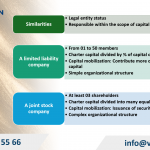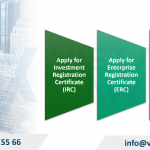Vietnam in recent years has witnessed a strong and massive wave of investment from foreign investors searching for business opportunities. With the promulgation of the Law on Investment and the Law on Enterprise 2014 as amended and replaced in 2020, Vietnam has instituted a legal framework to regulate investment participation as well as the enterprises establishment of foreign investors in Vietnam. Thereby improving the investment environment towards creating a fair competitive environment while protecting national security. Based on current laws, foreign investors looking for investment opportunities in Vietnam may choose one of these two options for establishing enterprises with foreign elements as follows:

Option 1: Propose for a first investment registration certificate (whether it is a 100% foreign-invested enterprise or a joint venture enterprise) and then follow the procedures to apply for a Enterprise Registration Certificate.
Option 2: Invest in the form of capital contribution or purchase of shares or stakes in Vietnamese business, and then participating in managing the company as agreed by the parties.
Each of the above options has certain advantages and disadvantages related to conditions, administrative procedures and management issues when implementing investment projects in Vietnam.
For example, if foreign investors choose option 1, they need to perform two procedures: investment registration and enterprise registration in before operating. However, the process of obtaining Investment Registration Certificate and Enterprise Registration Certificate for foreign enterprises have more complicated than that of domestic enterprises. Specifically, it requires much of time to complete the processes for certificates of capital contribution, investment capital for project implementation, capital contribution ratio,… If the procedure is proceed in this direction, the enterprise with 100% foreign capital will own the company and fully decide on business policies as well as directly hold profits. Whereas joint ventures enterprise will have the potential to grow by having the support of science, technology, market share and capital of each other.
For option 2, the advantages and disadvantages will be the opposite of Option 1. Therefore, investors need to consider their objectives carefully before deciding on the form of investment.
Cases where procedures for issuance of investment registration certificates are required (Articles 23 and 37 of the Law on Investment 2020):
– There are foreign investors holding 51% or more of charter capital or most of the general partners are foreign individuals for economic organizations being partnerships;
– Having an economic organization defined in Point a of this Clause holds 51% or more of charter capital;
– Having foreign investors and economic organizations defined at Point a of this Clause, holding 51% or more of the charter capital.
In order to provide legal information on conditions and procedures for foreign investors coming to Vietnam for investment, Viet An Law Firm would like to send our customers some of the following notes:
The investor wants to obtain an Investment Certificate and then proceeds to establish an enterprise
Vietnam became a WTO member in 2007, under which there will exist a commitment to adjust the conditions of foreign investors when conducting trade and services in Vietnam. Therefore, not all sector in Vietnam will open up and each sector will have different levels of opening. Investors need to find out clearly whether the lines of business investment is in the commitment sheet or not and the level of opening before proceeding to apply for an Investment Certificate. This information can be found in Vietnam’s WTO Commitments Schedule.
After identifying the investment field, the investor needs to prove financial capability to implement the project by confirming the account balance (for individuals) or the latest financial statements (for the institutes); project approval (for projects requiring investment policy decisions) and investment project information.
Currently, Vietnam allows the submission of online investment application through the National portal for foreign investment. Investors need to perform 3 steps:
Attention:
After accomplishing all necessary investment procedures, the foreign investor submits the business registration dossier at the Business Registration Office to carry out the procedures for seal engraving and publishes the seal sample.
In case of establishment of a joint venture company between Vietnamese investors and foreign investors, the optimal plan and procedures to be minimized are proposed as follows:
Step 1: Establish a Vietnamese company;
Step 2: Obtaining a qualified license for conditional sectors;
Step 3: Transfer of contributed capital to foreign investors;
Step 4: Obtaining a business license for retail distribution.
As a leading unit in consulting legal advice on procedures for establishing foreign-invested enterprises, Viet An Law Firm believes in our quality of providing the best legal service to foreign investors in starting a business effectively and successfully in Vietnam.
Table of contents




